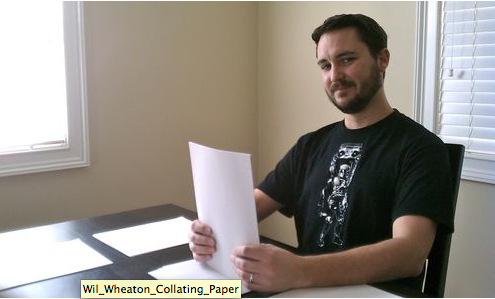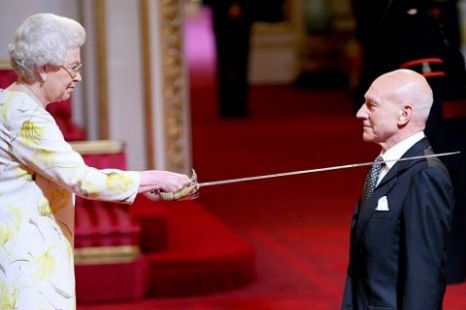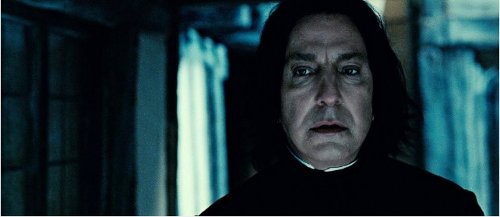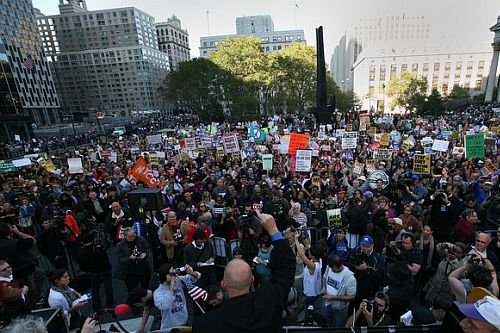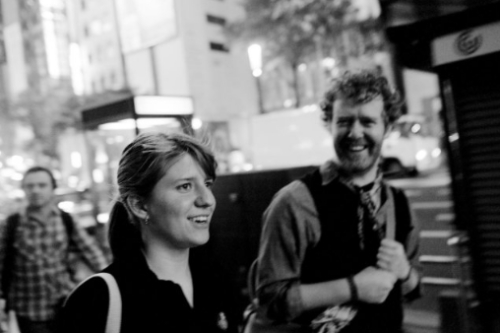Film Essent Archive for October, 2011
Adventures in Filmmaking: Scripting and Casting and Crewing. Oh My.
Bunker Production Journal
October 31, 2011
So, last time in Adventures in Filmmaking, I shared with you our recent trials and travails around having to replace our DP kind of last minute. But now, no fear! All is well in Bunker-land, and now that we have our crew and our cast all lined up, I thought I would share with the group a bit about what our process was in getting this done, because if you’re a new filmmaker, or want to be a filmmaker yourself, you’re maybe wondering how other people go about this process. And if you’re an experienced filmmaker, you can snicker behind your hand at the things I did wrong, or didn’t know how to do at first, or made harder than they need to be. From my perspective, everything I do on this film, whether I nail it out of the gate or screw it up and have to fix it, is part of the learning process that will make me a better filmmaker eventually, right? Right.
Read the full article »
Occupy the Filmmaking Revolution
A couple days ago, Eric Kohn had this great little interview with Anton Yelchin. For me, the most important bit of the piece was where Yelchin talks about how his experience making Like Crazy made him interested in helping to fund microindies:
So the fact that there’s technology and means available to edit something at home and to shoot it on a consumer-level camera for no money with 10 people on the crew, a small group of really dedicated people—I can’t say that enough—how fundamental it is to the evolution of the industry and the development of filmmaking outside of spectacle filmmaking. I’m a huge supporter of it. I was talking with a buddy of mine about pitching in and making small movies for like five grand, 10 grand.
What Yelchin is talking about here is exactly what Ted Hope has been preaching about forever, this idea of indie filmmaking as a community, the give and take. The ability to make small movies for five or 10 thousand dollars. Which, let me tell you, really can only happen if you’re shooting with your friends as the film crew and they’re all working for free, because if you’re shooting even a low budget indie and hiring (and paying) outside professional crew, there’s no way in hell you’re making a feature film for that cash.
This is partly why I chose the specific people I chose for my crew for Bunker. I was looking not just to pay a bunch of hired guns for this one shoot (although we are paying our crew, and it’s not cheap), but to start building a community of film crew that I’d like to work with in the long haul. You see a ton of that in LA and NY and Seattle and other little pockets of creative filmmaking, these small groups of filmmaking collectives, as it were, taking turns writing and directing and editing and producing each others’ movies, the same crew members rotating around, squeezing in passion projects for friends around their commercial work. This is one way to get small films made off the grid, so to speak.
You’ll probably still have to dig into your savings, or beg from friends and family, or run a crowdfunding campaign, to pay for all the things you can’t get completely for free. Maybe you’ll have to shoot your film on weekends when your friends are available over months or years. But at the end of the day, you’ll get it done, and your friends will get their films done, and hopefully you won’t completely break the bank while doing it, and end up with a film worth submitting to some fests, that will garner some attention from someone who wants to give you money to get your next project done.
This is the other reason we started Catawampus! Productions. Every dollar we have that we can scrounge out of our household finances will be going back to the company. Anything we make off our work in this realm, short of our frugal living expenses, goes back into the company. And eventually, we’d like to be in a position also to help finance smaller films, both for filmmakers we work with regularly, and filmmakers whose work we believe in. It will take a while, and a lot of work, to get there. But if you believe in filmmaking as being of value to society, of having value as an art form, and you are fortunate enough to be able to actually make something resembling a living while working in this business, I believe strongly you have an obligation to give back by helping other filmmakers you believe in get their start, too.
I know a great many folks on the technical side of this industry who already give back with their work. They take on lucrative commercial work to pay their bills, so that they can work for free or a seriously cut rate on passion indie projects. This is a way of giving back to the art form. A lot of successful actors do this as well — do a studio project for the cash, then an indie project for the love of film. But just imagine if actors, directors and producers who’ve been very successful made it a practice to give back to the film community by setting aside a percentage of their profits off each project into a fund specifically for funding microindie projects that help other filmmakers get a leg up. Filmmakers who’ve shown promise, or the dedication to getting a project done and seeing it through.
Occupy Filmmaking? What would that look like, to have real, viable support for filmmakers working outside the studio system? Maybe that would be great, or maybe it would just mean fest programmers would have an even bigger glut of amateuristic films to slog through. Feel free to sound off with your thoughts below.
2 Comments »Check This Out: The Best Teen Anti-Drunk Driving PSA Ever
Leave it to New Zealand to come up with a “don’t let your friends drive drunk” PSA that’s actually funny, not condescending, and doesn’t pretend that teens don’t drink. Imagine the moralizing from the religious right if something like this was playing widely over here in the states. There’d be some folks with their knickers in a serious twist over the depiction of teens partying. Kinda like how they like to pretend that abstinence campaigns actually prevent teen pregnancy and abortion. Anyhow, this is brilliant.
(Hat tip: Steve Norwood via Facebook)
3 Comments »Adventures in Filmmaking: Problems and Solutions
Production Journal, Bunker
10/26/11
We’re a little over three weeks from shooting my short film, Bunker. Nerve-wracked as hell and not sleeping much.
I know, I know, the conventional wisdom is you’re supposed to never reveal what’s behind the curtain and all that. In the years I’ve been seriously studying the art and business of making movies, I’ve hunted out a lot in the way of production journals and whatnot, because there’s value to be gained from the stories of people who already do what you’d like to be doing. There’s such a wealth of knowledge out there, and certainly some at the top of the industry who’ve been generous with sharing their knowledge with the rest of us. But what I’m most interested in is reading transparently honest captures from other filmmakers about what they’re doing, RIGHT NOW as they’re working on their movies. What’s your process? What works for you? What was a disaster? I want to hear about the mistakes you made along the way and how you solved the inevitable problems. I love Christine Vachon’s books, but I’d also love to read a live journal of Killer Films’ current productions.
I, not having any handlers at this junction, can write pretty much whatever I like down as I’m working on this film. So, this week in Adventures in Filmmaking, or, How I Learned that Making a Movie, While Fun, is Also Very, Very, Very Stressful:
Read the full article »
Conversations I Have with Myself …
Can we talk? Look, I really, really prefer to fly Virgin to NYC.
No! It’s so much more spendy!
But … the flight would be so much more comfortable … and it’s a really long flight, too. I need leg room. I could get a blood clot again. Remember that? That sucked.
If you were just flying to LAX, sure, you could fly Virgin. But to NYC, it’s way more spendy. So, no. Besides, you have your shots to take for the blood clot thing. Nice try.
But … Virgin has purple mood lighting! And very comfy white leather seats! And peppy music while you’re boarding.
*sigh*
And all my friends fly Virgin when they have to fly west to east coast. They do! Because United and American suck. I hate those guys.
I said NO and that’s final. I don’t care what your friends do. I’m not paying for your friends. You’ll fly some other airline that’s not Virgin, or United, or American, and you’ll deal with it. You’ll live. You’re flying red-eye anyhow. You’ll sleep the whole flight. You can imagine there’s purple mood lighting and white leather seats.
Darn it. I hate it when I lose these arguments.
1 Comment »Check This Out: Helicopter
Years before he made Adventures in Power, filmmaker Ari Gold made this student short, Helicopter, which won the Gold Medal at the Student Academy Awards. The experimental film explores the impact of the death of Gold’s mother, Melissa, who died 20 years ago today in the helicopter crash that also took the life of her boyfriend, legendary rock promoter Bill Graham and his pilot.
Whereas the media coverage surrounding Graham’s death and the subsequent star-studded benefit concert at Central Park in his honor focused on the loss of a rock legend, this very personal short tells the story from the perspective of Melissa Gold’s three children, and what the crash took from them. At 20 minutes, it’s a tad long (although contrary to most fest programmers, who like their shorts “short,” Oscar tends to favor slightly longer shorts that take more time to tell a complete story, like this one), but if you’ve never seen it, it’s well worth a watch. Much as I think Adventures in Power was a cute, fun little film, this is the kind of personal storytelling I’d really like to see Gold do more of. Check it out.
And Speaking of Patrick Stewart
Well, we weren’t really speaking of him, per se. Just talking about a picture of him being beheaded by Queen Elizabeth II, who appears to be wearing, for the occasion, some sort of blood-spatter-proof granny robe. But seeing Stewart in that photo, smiling bravely moments before what he surely thought was his imminent brutal demise, reminded me of one of my favorite things that happened in NYC, way back before we relocated out to the Left Coast to the Socialist Republic of Seattle.
Years ago, when my daughter Meg was ten years old (she just turned 26, which makes me officially O-L-D), we took her and my mom to see a few Broadway plays. One of them was The Tempest at the Broadhurst Theater, which we (and Meg) were very excited about seeing because Patrick Stewart was playing Prospero and of course we are all Star Trek geeks around here (especially ST:TNG — do not get me started on my rant about why Picard is far superior to Kirk). We managed to score four seats, two in the front row and two right behind those seats in the second row, and we put Meg and my mom in the front row seats.
Patrick Stewart strode out upon that stage, larger than life, rippling with muscle and, speaking perfectly objectively, looking altogether studly and debonair, and then, miscalculating his trajectory — or, perhaps, modestly unaware of his own manly strength — he kicked sand all over my daughter and her fancy dress. And for a second, he actually broke character and looked down at Meg, all covered in sand and round-eyed and beaming, and smiled at her apologetically before carrying on.
She never wanted to take a bath again.
2 Comments »I’ll See Your Wil Wheaton Collating Paper. And I’ll Raise You …
Henceforth, I am going to respond to all unsolicited PR emails about random celebrity crap I don’t care about with a link over to my fave internet writer, The Bloggess, who has the Best Response Ever to unsolicited PR emails: this lovely picture of Wil Wheaton collating paper.
and this brilliantly bitchy letter to accompany it.
Now I know what you’re thinking. The Bloggess is so mean! PR people are just doing their job! And besides, who doesn’t love Wil Wheaton? And paper? And especially Wil Wheaton collating paper? Exactly.
Now, my friends who work in PR, you know I love you. And I know that most of you would never send me stupid emails asking me to run a contest giving away this or that because I don’t run contests on my blog and you know this. And most of you wouldn’t send me an email asking me to interview a would-be celebrity, or even a real live celebrity, because you know I very rarely interview anyone these days unless I find them terribly fascinating. Nor would you harass me to review a TV show or a book unrelated to anything I’m likely to care about. But the rest of you lot? I’m getting tired of having to mass delete so many PR emails out of my inbox every morning. You’re cutting into my Pinterest and Twitter time.
Important note: This does not apply to indie filmmakers who want to hit me up to watch their film, whether narrative or doc, short or feature. You folks, continue to hit me up about your project, and I will make every effort to watch it, and if I like it I will most likely write it up.
Anyone else, though, let this be a warning to you. Any more unsolicited, stupid PR emails, and I will not only see The Bloggess’s Wil Wheaton collating paper, I will raise her one Patrick Stewart about to be beheaded by Queen Elizabeth II.
So there.
Update: By the way, this is what happens when the VP of a PR company responds to a post about their crappy research and form letter press release by accidentally hitting “reply all” to a forwarded company email, calling said blogger — who has over 160,000 followers on Twitter — a “fucking bitch.” Hint: It probably wasn’t pretty for Jose.
2 Comments »Lights, Camera …
We’re just under a month away from shooting my first film, a little short called Bunker, so it seemed an appropriate time to make some sort of official-sounding announcement about that here on Film Essent and MCN. This is something I’ve been working toward for the better part of 15 years, when I first started learning the craft of writing screenplays, working on them every night from about 1AM until 3AM because my now-going-on-15-year-old daughter, when she was a baby, got it in her wee little baby brain that 1AM was a fine and dandy time to wake up to play. By day I worked as a project manager for Kodak, but Neve didn’t care much that I had to be up to go to work the next day. No matter what time we got her to sleep, she was a reliable little alarm clock: 1AM would hit, I’d be lying there next to her, she’d coo and drool and kick me awake and I’d look over at those round brown eyes, wide awake and staring, and know there was no way in hell she was going back to sleep anytime soon. So I got in the routine of going to bed earlier myself so that when she woke me up, I could take her downstairs to our office, make myself a cup of tea, and then get in a solid couple hours writing while she played with her toys.
Several years later, I shifted back into journalism, writing about film. I always knew that the end game, somewhere down the road when kids were older and I’d have time to pursue it, was to transition into filmmaking, so I’ve approached criticism from the standpoint of wanting to learn as much as possible about what makes films work (or not work) so that I could eventually apply that knowledge to making films myself. But thinking about making films eventually is one thing, whereas actually taking that leap and doing it is another. It’s taken almost nine years of writing and studying, and then a bout of illness that made me really reflect on what I was waiting for, for me to finally reach the point of stepping off that metaphorical cliff to see what kind of filmmaker I can be.
Read the full article »
New York Film Critics Circle is now FIRST!
So, the New York Film Critics Circle announced today that it’s moving up its voting to November 28, beating out the New York Board of Review. Huzzah. What’s the point of this, exactly? As David pointed out in his Hot Blog post about this, it’s about being FIRST! and nothing more. It reduces the legitimacy and relevance of the NYFCC to the desire to be seen as FIRST! to the discussion about something most everyone on the writing side of our industry likes to pretend doesn’t matter. You want to set a group of film journalists at each others’ throats in a hurry? Start speculating about awards season, then step back out of the fray and watch in amusement as pundits pontificate and skeptics get their shorts in a bunch about criticism versus Oscars. It’s almost as fun as starting a debate about the merits of junkets, and where we draw the line between journalism and publicity.
The reality is that most of us do speculate, or at least think about awards season, whether we write about it or Guru about it or what have you, or whether we don’t. Every other conversation in lines and at late-hour drinking binges at the bars between the Lightbox and Scotiabank at Toronto this year was about whether this or that film’s TIFF reception boded well — or ill — for awards season hopes. Same as last year, and the year before that, and the year before that. Whether the NYFCC votes before or after the Board of Review means, really, bupkis, other than possibly screwing over the few films who actually prefer to wait to screen their films in December. You know, the last month of the year for which NYFCC is supposedly voting on their awards. And perhaps it will force some of those distributors to decide if they’ll screen earlier to accommodate NYFCC or not, so that the NYFCC can see them FIRST! and thereby consider them in their voting. Or not.
Either way, really, does it matter? If a couple of distributors actually chose to say, sorry, we’re not changing our schedule because you’ve decided to change yours, what’s the worst that could happen? Is a truly legitimate awards contender likely to get cut from the pack just because the NYFCC didn’t see it in time to vote for it? If it’s really all that and a bag of chips, I don’t think so. The other groups will weigh in, in their time, the conversation will still happen, the Oscars will still go on. It’s like a pack of third graders pushing and shoving to be first in line to get the same cafeteria lunch every kid in line will end up with anyhow.
It’s all just so tiresome, this relentless desire of the internet age to be FIRST! and to say TOLDJA! and whatnot, even when the TOLDJAs are largely press releases that someone got an hour ahead of the pack, or the FIRST! is little more than a bid to be the first to officially say “Hey, these are the films we liked!” in a discussion that started at Toronto and will go on until Oscar night. Yawn.
1 Comment »Harry Potter and the Elusive Naked Golden Man

We’re near that time of year when the awards-screener fairy starts delivering DVDs to our doorsteps, but things have a long ways to go before they get anywhere close to nailed down. Nonetheless, I’ve been pondering lately whether the final movie of the Harry Potter series might possibly be a serious awards contender. Will Harry Potter and the Deathly Hallows, Part 2 finally snag that elusive Best Picture Oscar nod? When it came out in July to rave reviews (it was at 97% on Rotten Tomatoes for a while, though it’s currently dipped a notch to 96%) there was a bit of speculation that seemed to indicate that maybe, just maybe, it could. By August, there was talk that Warner Brothers would be giving the film a serious Oscar push. Now here we are just a couple months later, and not a single one of MCNs Gurus even gave it a one-vote wonder shot.
Read the full article »
On Occupy Wall Street and the 99%

Say what you will about 20-something anarchist-hipster-losers and aging rebel hippies – this whole Occupy Movement is almost starting to look a little promising. The middle class, the lower class, students, unemployed workers, union members, and even some folks from that legendary 1% – lots of folks from all walks of life are standing up together, demanding change. I, for one, am glad to see the people rising up and saying, “Enough, already.” I especially embrace the younger generation getting out on the streets; when’s the last time they gave an indication they care about anything? Maybe during the Obama election, or Prop 8 or something. Apathy comes from a place of feeling that there’s no hope for change, of feeling that your voice doesn’t matter. And maybe that perception is starting to shift with the agitation of the Occupy protests.
The more I poke around and read stories of people supporting this mass protest, the more I see both revelation, and the tiniest spark of potential for real revolution. Spend any time reading the stories of those standing in solidarity with Occupy Wall Street and you will see yourself, or your friends, or your family, or your neighbor. And yes, it heartens me to see some 1-percenters standing up and saying, hey, I stand in solidarity, too; tax me more, I can afford it. I hear what you’re saying, you who resent these rich kids standing in solidarity with the working class. What right have any of those spoiled-rotten trust fund babies to raise their voices, right? They’re part of the problem – or to be more accurate, some of them come from the problem … but that’s not quite the same thing, is it? It’s not much different, at the end of the day, than the white people who stood in solidarity with black people during the Civil Rights movement; they are seeking to not be a part of the problem any longer. Trust fund kids didn’t choose to be born rich, anymore than you and I chose not to be born rich. What would you have them do? Quirk their pinky fingers and trill, “Let them eat cake!”? I’m glad to see at least some of them standing up and saying, “Look, we want things to be fair for everyone. We want change.” What’s the problem with that, oh cynical ones?
Read the full article »
So, You’re an Editor
Another tragically funny tale from post-production hell. Enjoy, and happy Friday!
Review: The Swell Season
In 2007, a little low-budget indie out of Ireland called Once took the indie film world by storm. The film told the story of a busker singing on street corners (The Frames’ Glen Hansard, in a role that largely mirrors his own beginnings as a musician), his relationship with a young pianist and singer (Markéta Irglová), and the music the two of them make together.
One of the best-known scenes in Once shows the characters writing the song “Falling Slowly” in a music store, him playing guitar and calling out chords, her playing along on the piano and finding a perfect harmony a third up from his melody, until their musical lines cross over in the chorus and he’s suddenly singing a falsetto harmony over her melody. It’s a lovely scene, and the song went on to win Best Song at the 2008 Oscars for the pair. The documentary The Swell Season (also the band name under which Hansard and Irglová collaborate and tour), filmed from 2007 to 2010, picks up where the Oscars left off, showing us what happened to Hansard and Irglová after that glowing Oscar victory.
The film builds on the naturalistic feel of Once, shot in black-and-white and back-and-forthing between scenes of Hansard and Irglová as a couple: singing together, frolicking naked in the surf, sharing moments both sweet and fraught with tension; freestyle interviews with Hansard’s proud parents and various members of their entourage; and individual interviews with the duo chronicling both their personal stories and the tale of the rise and fall of their romance.
It’s no spoiler to say that the fairy-tale romance between Hansard and Irglová didn’t last, although the pair remain collaborators and friends. And The Swell Season gently, respectfully shows the trajectory of their relationship, and how their sudden rise to fame following the widespread success of Once and their Oscar win affected them both as a couple and individually. Hansard, 18 years older than Irglová, had been performing as for 17 years before he found success with Once and “Falling Slowly,” but for Irglová, just 17 when filming on Once started, fame came overnight.
What’s interesting about the dynamic arc of this documentary of their story is that we see how there are times when Irglová is overwhelmed by the attention of fans and the pressure of touring, while Hansard seems irritated by her reluctance and dismissive of her concerns. But then it flips around later in a scene where she gently admonishes him for fighting against fame so hard, when he wanted and pursued it all along: “And it’s just such a hard existence, is it not? To always find the battle? Why can’t you just … I don’t know, it’s like … You wanted it, you can’t say you didn’t want it. And now you’re rejecting it. I just find the idea of living my life with a constant sense of struggle really exhausting. I can’t imagine living my life that way.”
He wants her sympathy, she delivers a dose of pragmatic reality, and we sense the end is nearing for their romance.
Fortunately, the film avoids veering too far into maudlin, “reality TV” territory by not overly dwelling on the tension and the fights between the pair paparazzi-style, but still showing honestly the impact of fame on each of them. Hansard’s mother, obviously bursting with pride at her son’s success, goes on and on and on about the Oscar, and clearly has hopes that her son and his songbird partner will marry. “Imagine if you had a child, and he could say his mom and dad both have an Oscar!” she gushes.
The pleasure she takes in the reflected glory of Hansard’s fame starts to rub at her son; they argue about her desire that he have constant fame and attention, while he’s growing weary and wondering what’s the point. Don’t take it away from me, she pleads. Let me think what I think, and leave that be. And he does, but later berates himself for tarnishing the happiness his success has brought to the lives of both his mother and his stalwart, emotionally walled-off father. When Hansard argues with his mother, he says he’s not sure it really matters if he’s remembered seven generations hence. Who cares, after all? What does it matter? But in the end, he’s still singing his heart out, strumming that guitar, and she can still lay claim to having the only son in their town to ever win an Oscar.
There are fights, and reminiscing, and raucous moments of fun and cutting loose on tour. And there are some heartfelt performances by the pair sprinkled liberally throughout the film. Hansard’s roving, gravelly vocals, his emotion and anguish and passion dominate the stage in one way, while Irglová’s gentle, transparent vulnerability captivate in another. They harmonize effortlessly, and it’s easy to see why fans of the pair have romanticized them in much the same way that, say, hardcore Fleetwood Mac fans felt (and still feel) ownership of the on-again, off again relationship between Stevie Nicks and Lindsey Buckingham. It’s easy to idealize and simplify love when you see a couple collaborate so organically in an artistic way; if they can do that, we think, why, the rest should be just easy. But of course, life isn’t that simple, or that sweet.
There’s a scene in The Swell Season where Hansard and Irglová are working on a song, and it very much — probably deliberately — mirrors the “Falling Slowly” scene from Once: Hansard guiding the way, calling out the chords, Irglová looking to him with complete trust and love and following his lead, her lilting harmony blending her voice smoothly into his. It bookends very nicely with an interview bit of Hansard talking about how he’d always played music with guys before, and until he started making music with Irglová, he’d never been able to be so vulnerable musically. For a while there, that effortlessness of creative collaboration must have felt truly magical, the sort of thing that as an artist, you hope to find but rarely do.
But as things progress (or perhaps, to be more accurate, as the film has been edited to reflect) and Irglová starts to find her own voice, her own way, she looks more and more to herself and to a future in which she’s forging her own path, making a destiny that’s truly her own. She’s no longer the young girl all starry-eyed over the older, seasoned musician, and he’s seeking some level of reassurance and steadfastness of love that it seems, for her at least, has mellowed more into an abiding friendship and deep respect than a need for a life partnership.
And it’s heartbreaking and tragic and sweet all at once; as has been true of relationships probably since long before Shakespeare observed that “the course of true love never did run smooth,” romantic love, however it may feel in the beginning, simply does not always sustain the growth and changes two lovers undergo as life moves on around and through them.
The film opens with Hansard telling an anecdote at a concert about kicking a ball and watching it go farther and farther away, farther than you ever thought possible. And a part of you, he says, is thinking wow, I can’t believe I really kicked the ball that far. But there’s a part of you, he half-jokingly muses, that just wishes you could have your damn ball back. The audience laughs, but there’s a note of sorrow and regret in his voice, a certain something in his stature, that feels very sad. Is he talking about the love he shared with Irglová, or the life he had before he finally found the fame that had eluded him for so many years? A little of both, perhaps. This is life and love: the falling in and the falling out, the hope and the sorrow, the bittersweet ending, the cost of fame. And, at the end, a hope that the music and friendship that drew them together will outlast the fleeting nature of the love that bloomed and then faded.
Where to see it: The Swell Season plays at Downtown Independent in LA through October 13 before opening at the Alamo Drafthouse in Austin October 17 and Cinema Village in NY October 21. For other showtimes near you, see the film’s schedule on its official website.
And Now for a Little Femme Perspective
Having kind of a blah Monday … feeling a bit under the weather, dealing with a sickish kiddo, and generally just having one of those road-blocky days were everyone you seem to encounter is abrasive or angry or argumentative.
Days like this, I just want to crawl in bed under my favorite fuzzy blanket and, like Waiting for Guffman‘s Corky St. Clair, go home and bite my pillow. Instead, I made the call that this was not the best day for communicating with others, and so spent a nice chunk of the day holed up and reading various pieces by some female writers, and a couple things on femme topics, so I thought I’d share with the group a few things that might have slipped under your own radar. Happy reading …
Read the full article »






